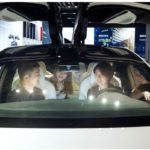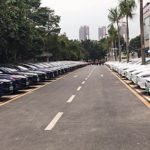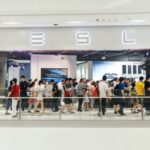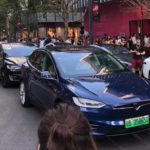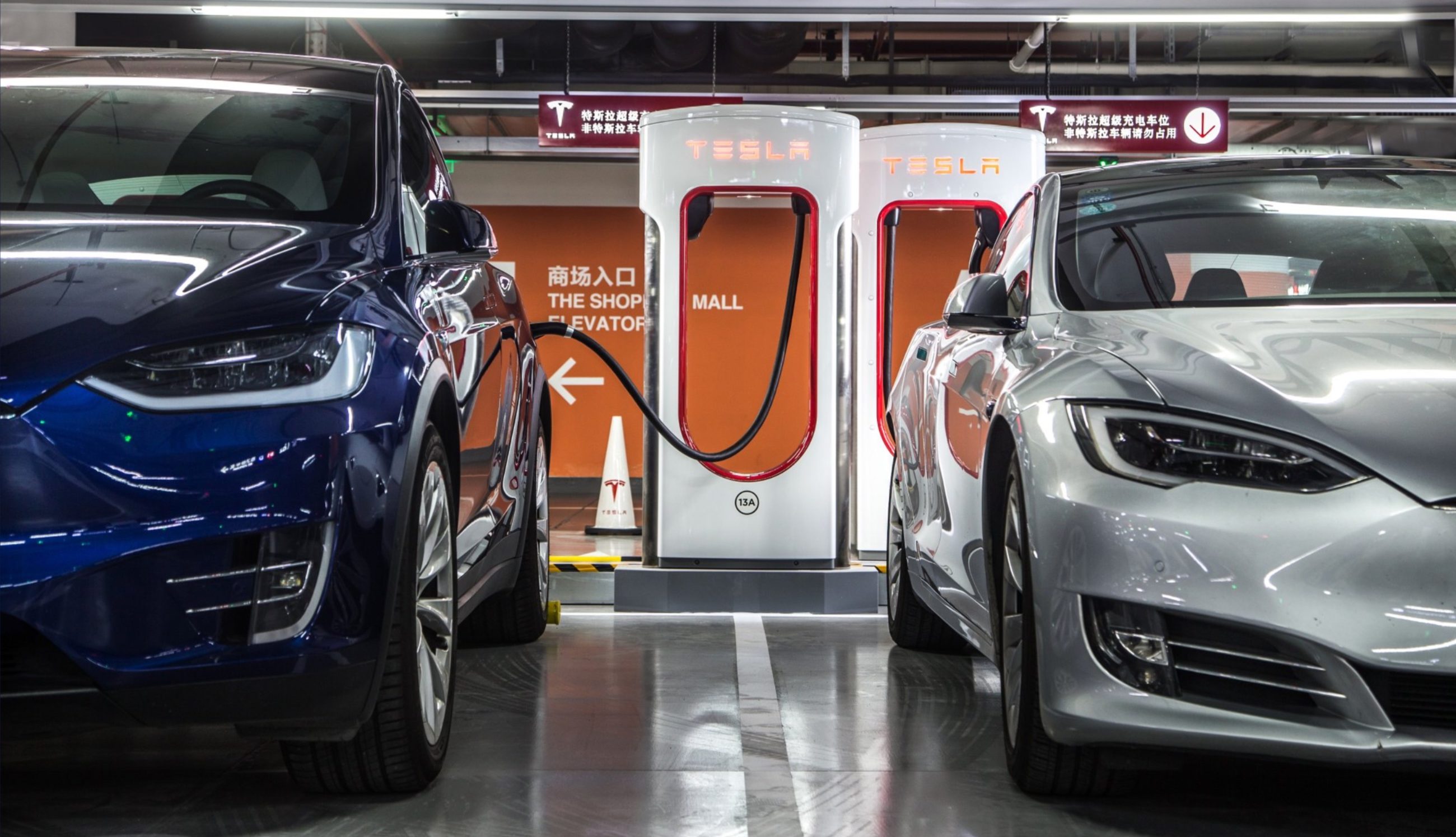

Investor's Corner
Tesla’s China factory can’t arrive soon enough amid escalating US-China trade war
Amidst the escalating trade war between the United States and China, American automakers such as Tesla have become the first victims of renewed, hefty tariffs on US-made products entering the country. In response to the 25% duties imposed by the United States government on $34 billion worth of Chinese imports last week, China has decided to strike back by placing a 40% levy on vehicles made in America.
The latest tariffs have forced Tesla to raise the prices of its Model S luxury sedan and its Model X SUV by 150,000 yuan ($22,647) to 250,000 yuan ($37,744). With the new duties in place, a fully-loaded Tesla Model S P100D now costs 1.47 million yuan ($221,937) in China, a far cry from the $147,000 price of the vehicle in the United States.
The latest tariffs come at a time when China implemented a reduction of its import duties for foreign-made vehicles from 20-25% to 15%. On the heels of the Chinese government’s announcement earlier this year, the response from Tesla’s customer base in the country was immediate. In Tesla’s Shanghai gallery alone, prospective buyers cleared out the store’s entire Model X 75D inventory in 24 hours after it was announced that the price of the vehicle would be reduced by $11,000 after the 15% tariffs were implemented.
While it is unfortunate to see the ongoing trade dispute between the United States and China once more affecting the prices of Tesla’s vehicles in the country, it is pertinent to note that even with hefty taxes placed on its electric cars, Tesla was fighting the good fight in China, and it was still thriving. The company, after all, established its presence and its reputation under an environment where its cars were priced far beyond its local competition.
Tesla’s story in China is one that showcases the learning curve that the California-based electric car and energy company continues to go through. Tesla began taking pre-orders for the Model S in China in August 2013. At that point in Tesla’s history, CEO Elon Musk was not even sure how much the production vehicle would cost. Deliveries were also expected to be eight months away. Anticipation among Chinese buyers, however, were high nonetheless, thanks to a combination of factors including Elon Musk’s rockstar status, as well as talks about the vehicle’s performance and supercar-worthy acceleration. Pre-orders for the Model S topped 5,000 that year.
Unfortunately, Tesla was not able to support these first Model S owners properly. Due to miscalculations on its business strategy, Tesla ended up with a lot of disgruntled Chinese owners. One Model S buyer even made national news after he smashed the windshield of his own Tesla after the car arrived months later than expected. To top it off, the Supercharger network, widely considered as Tesla’s ace in the electric car industry today, was still in its infancy then, and China only had a small system centered around key cities. Things changed, however, on January 2015, when Elon Musk flew to China and met with President Xi Jinping. Musk also admitted to Tesla’s “earlier mistakes,” stating that he was nonetheless “very optimistic” about the company’s chances in the country. Tesla also attended the Shanghai Auto Show, sparking more interest in its electric vehicles.
- Tesla’s grand opening of its Changsha, China store. [Credit: @vincent13031925/Twitter]
- Credit: Dennis Chang via Twitter
- Tesla’s grand opening of its Changsha, China store. [Credit: @vincent13031925/Twitter]
- Tesla’s grand opening of its Shenzhen, China store. [Credit: @vincent13031925/Twitter]
In the months that followed, Tesla expanded its Supercharger network, curbing the “range anxiety” of China’s electric car owners. Word-of-mouth about the company’s non-dealership sales model also started spreading. Tesla’s business in China experienced a massive boost when it introduced the Model X as well, considering the country’s obsession with SUVs. Government regulations, such as Shanghai’s electric-car friendly license plates gave even more benefits to Tesla. By the end of 2017, Tesla had already opened the largest Supercharger in the world in Shanghai. The company’s sales in the country in 2016 also helped boost its revenue enough to join the Fortune 500 list for the first time.
With Tesla’s history in mind, the renewed tariffs from the United States and China’s ongoing trade dispute could actually have little effect on Tesla’s overall operations in the country. The new duties will result in lost sales — that much is a given — but Tesla’s pedigree as a luxury automaker that makes cars that are the ultimate status symbols in China remain undaunted.

Tesla’s approval for its China site from the Central Committee of the Communist Party of China. [Credit: vincent13031925/Twitter]
Tesla, after all, has not really started its mass market push in China. The Model 3 and the Model Y, the company’s two vehicles that are targeted to dominate in the midrange segment, have not arrived in the country as of yet. With Elon Musk confirming during the Q1 2018 earnings call that the next Gigafactory will be in China, and that the facility will incorporate vehicle production, the solely-owned factory should allow Tesla to avoid the import taxes imposed on its upcoming, more budget-friendly vehicles — trade war or no trade war.
Tesla’s China Gigafactory is expected to be the site where the electric car maker will manufacture the Model Y crossover SUV, as well as some of the Model 3. Both vehicles are targeted towards the mass-market, with Tesla estimating that the Model Y could see a demand of up to 1 million vehicles per year. With the Model Y and Model 3, Tesla could compete in China not only in the luxury segment, but on the more lucrative and more competitive midrange market as well. For now, however, Tesla’s efforts to establish its own factory in China seems to be going well, with the company being granted a final approval for its solely-owned electric car facility by the Central Committee of the Communist Party of China.
Elon Musk
Tesla analyst issues stern warning to investors: forget Trump-Musk feud

A Tesla analyst today said that investors should not lose sight of what is truly important in the grand scheme of being a shareholder, and that any near-term drama between CEO Elon Musk and U.S. President Donald Trump should not outshine the progress made by the company.
Gene Munster of Deepwater Management said that Tesla’s progress in autonomy is a much larger influence and a significantly bigger part of the company’s story than any disagreement between political policies.
Munster appeared on CNBC‘s “Closing Bell” yesterday to reiterate this point:
“One thing that is critical for Tesla investors to remember is that what’s going on with the business, with autonomy, the progress that they’re making, albeit early, is much bigger than any feud that is going to happen week-to-week between the President and Elon. So, I understand the reaction, but ultimately, I think that cooler heads will prevail. If they don’t, autonomy is still coming, one way or the other.”
BREAKING: GENE MUNSTER SAYS — $TSLA AUTONOMY IS “MUCH BIGGER” THAN ANY FEUD 👀
He says robotaxis are coming regardless ! pic.twitter.com/ytpPcwUTFy
— TheSonOfWalkley (@TheSonOfWalkley) July 2, 2025
This is a point that other analysts like Dan Ives of Wedbush and Cathie Wood of ARK Invest also made yesterday.
On two occasions over the past month, Musk and President Trump have gotten involved in a very public disagreement over the “Big Beautiful Bill,” which officially passed through the Senate yesterday and is making its way to the House of Representatives.
Musk is upset with the spending in the bill, while President Trump continues to reiterate that the Tesla CEO is only frustrated with the removal of an “EV mandate,” which does not exist federally, nor is it something Musk has expressed any frustration with.
In fact, Musk has pushed back against keeping federal subsidies for EVs, as long as gas and oil subsidies are also removed.
Nevertheless, Ives and Wood both said yesterday that they believe the political hardship between Musk and President Trump will pass because both realize the world is a better place with them on the same team.
Munster’s perspective is that, even though Musk’s feud with President Trump could apply near-term pressure to the stock, the company’s progress in autonomy is an indication that, in the long term, Tesla is set up to succeed.
Tesla launched its Robotaxi platform in Austin on June 22 and is expanding access to more members of the public. Austin residents are now reporting that they have been invited to join the program.
Elon Musk
Tesla surges following better-than-expected delivery report
Tesla saw some positive momentum during trading hours as it reported its deliveries for Q2.

Tesla (NASDAQ: TSLA) surged over four percent on Wednesday morning after the company reported better-than-expected deliveries. It was nearly right on consensus estimations, as Wall Street predicted the company would deliver 385,000 cars in Q2.
Tesla reported that it delivered 384,122 vehicles in Q2. Many, including those inside the Tesla community, were anticipating deliveries in the 340,000 to 360,000 range, while Wall Street seemed to get it just right.
Tesla delivers 384,000 vehicles in Q2 2025, deploys 9.6 GWh in energy storage
Despite Tesla meeting consensus estimations, there were real concerns about what the company would report for Q2.
There were reportedly brief pauses in production at Gigafactory Texas during the quarter and the ramp of the new Model Y configuration across the globe were expected to provide headwinds for the EV maker during the quarter.
At noon on the East Coast, Tesla shares were up about 4.5 percent.
It is expected that Tesla will likely equal the number of deliveries it completed in both of the past two years.
It has hovered at the 1.8 million mark since 2023, and it seems it is right on pace to match that once again. Early last year, Tesla said that annual growth would be “notably lower” than expected due to its development of a new vehicle platform, which will enable more affordable models to be offered to the public.
These cars are expected to be unveiled at some point this year, as Tesla said they were “on track” to be produced in the first half of the year. Tesla has yet to unveil these vehicle designs to the public.
Dan Ives of Wedbush said in a note to investors this morning that the company’s rebound in China in June reflects good things to come, especially given the Model Y and its ramp across the world.
He also said that Musk’s commitment to the company and return from politics played a major role in the company’s performance in Q2:
“If Musk continues to lead and remain in the driver’s seat, we believe Tesla is on a path to an accelerated growth path over the coming years with deliveries expected to ramp in the back-half of 2025 following the Model Y refresh cycle.”
Ives maintained his $500 price target and the ‘Outperform’ rating he held on the stock:
“Tesla’s future is in many ways the brightest it’s ever been in our view given autonomous, FSD, robotics, and many other technology innovations now on the horizon with 90% of the valuation being driven by autonomous and robotics over the coming years but Musk needs to focus on driving Tesla and not putting his political views first. We maintain our OUTPERFORM and $500 PT.”
Moving forward, investors will look to see some gradual growth over the next few quarters. At worst, Tesla should look to match 2023 and 2024 full-year delivery figures, which could be beaten if the automaker can offer those affordable models by the end of the year.
Investor's Corner
Tesla delivers 384,000 vehicles in Q2 2025, deploys 9.6 GWh in energy storage
The quarter’s 9.6 GWh energy storage deployment marks one of Tesla’s highest to date.
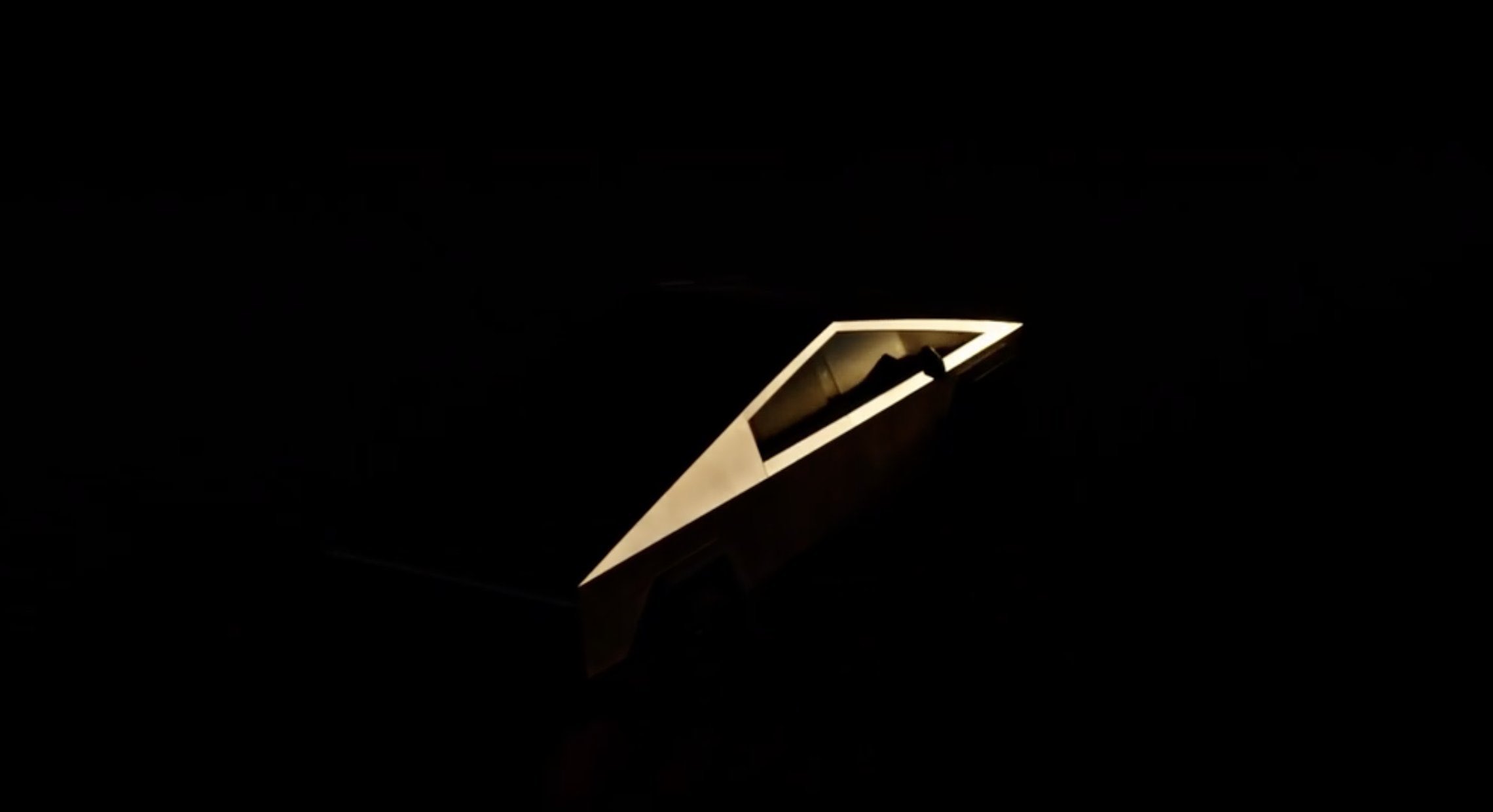
Tesla (NASDAQ: TSLA) has released its Q2 2025 vehicle delivery and production report. As per the report, the company delivered over 384,000 vehicles in the second quarter of 2025, while deploying 9.6 GWh in energy storage. Vehicle production also reached 410,244 units for the quarter.
Model 3/Y dominates output, ahead of earnings call
Of the 410,244 vehicles produced during the quarter, 396,835 were Model 3 and Model Y units, while 13,409 were attributed to Tesla’s other models, which includes the Cybertruck and Model S/X variants. Deliveries followed a similar pattern, with 373,728 Model 3/Ys delivered and 10,394 from other models, totaling 384,122.
The quarter’s 9.6 GWh energy storage deployment marks one of Tesla’s highest to date, signaling continued strength in the Megapack and Powerwall segments.

Year-on-year deliveries edge down, but energy shows resilience
Tesla will share its full Q2 2025 earnings results after the market closes on Wednesday, July 23, 2025, with a live earnings call scheduled for 4:30 p.m. CT / 5:30 p.m. ET. The company will publish its quarterly update at ir.tesla.com, followed by a Q&A webcast featuring company leadership. Executives such as CEO Elon Musk are expected to be in attendance.
Tesla investors are expected to inquire about several of the company’s ongoing projects in the upcoming Q2 2025 earnings call. Expected topics include the new Model Y ramp across the United States, China, and Germany, as well as the ramp of FSD in territories outside the US and China. Questions about the company’s Robotaxi business, as well as the long-referenced but yet to be announced affordable models are also expected.
-

 Elon Musk5 days ago
Elon Musk5 days agoTesla investors will be shocked by Jim Cramer’s latest assessment
-

 News1 week ago
News1 week agoTesla Robotaxi’s biggest challenge seems to be this one thing
-

 Elon Musk2 weeks ago
Elon Musk2 weeks agoFirst Look at Tesla’s Robotaxi App: features, design, and more
-

 News2 weeks ago
News2 weeks agoWatch Tesla’s first driverless public Robotaxi rides in Texas
-

 News2 weeks ago
News2 weeks agoWatch the first true Tesla Robotaxi intervention by safety monitor
-
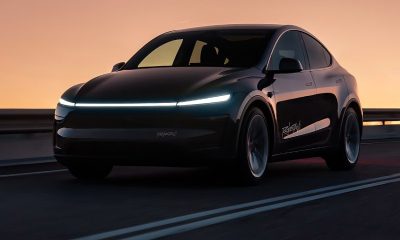
 Elon Musk2 weeks ago
Elon Musk2 weeks agoTesla officially launches Robotaxi service with no driver
-

 Elon Musk1 week ago
Elon Musk1 week agoA Tesla just delivered itself to a customer autonomously, Elon Musk confirms
-

 News2 weeks ago
News2 weeks agoTesla Robotaxi rollout proves that Elon Musk still delivers, even if it’s late

